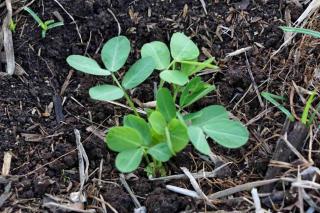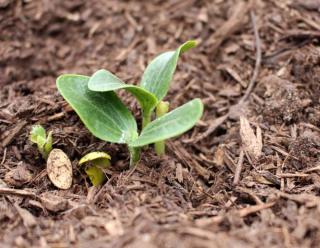Sowing in seed holes is very similar to sowing in rows, the only difference is that seeds are grouped in clusters instead of being sown one by one.
→ Learn about the different ways to sow seeds
Technique for sowing in seed holes
It’s similar to sowing in rows, except that instead of sowing only one seed at a time, you sow several together.
 Drop the seeds at the bottom of a hole that is anywhere from ½ to 1 inch (1 to 3 cm) deep, depending on the variety. Instead of holes, you can also group the seeds within a furrow. Furrows are easier to form with some tools.
Drop the seeds at the bottom of a hole that is anywhere from ½ to 1 inch (1 to 3 cm) deep, depending on the variety. Instead of holes, you can also group the seeds within a furrow. Furrows are easier to form with some tools.- Instead of spacing the plants regularly along the row, group them in clusters of 4 to 5 seeds, with the distance between clusters depending on the plant variety you wish to grow.
For example, if the plant is around 8 inches (20 cm) across when grown, then space your clusters of 4 to 5 seeds about 8 inches (20 cm) from each other.
- When the first sprouts appear, thin and only keep the nicest and most vigorous.
Why thin the seedlings?
Thinning means removing all but one of the seeds that have sprouted in a cluster. This has several advantages:
 It removes the competition between seedlings because only one is left per hole.
It removes the competition between seedlings because only one is left per hole.- Since it’s almost certain that at least one seed will sprout, it ensures that the entire row or garden space has something growing in it.
- Keeping the nicest seedling helps make sure the quality of the plant stays high.
- The strongest and most vigorous seed will benefit from the work that the smaller, weaker seedlings have already done in the soil with their roots.
- If you’re going to save seeds from your crop for the following season, thinning ensures you keep the most vigorous and early-sprouting strain. This is particularly important to grow better and better crops. It’s like practicing natural selection for the single trait of “quick sprouting”.
Smart tip about sowing in seed holes
- Draw your rows following the direction of main winds. This helps pollinators work more efficiently. It also helps aerate plants better, so that fungal diseases don’t develop as easily.
Images: dreamstime: Zsv3207; own work: Rosalyn & Gaspard Lorthiois; Pixabay: Cara Shelton


 Drop the seeds at the bottom of a hole that is anywhere from ½ to 1 inch (1 to 3 cm) deep, depending on the variety. Instead of holes, you can also group the seeds within a furrow. Furrows are easier to form with some tools.
Drop the seeds at the bottom of a hole that is anywhere from ½ to 1 inch (1 to 3 cm) deep, depending on the variety. Instead of holes, you can also group the seeds within a furrow. Furrows are easier to form with some tools. It removes the competition between seedlings because only one is left per hole.
It removes the competition between seedlings because only one is left per hole.